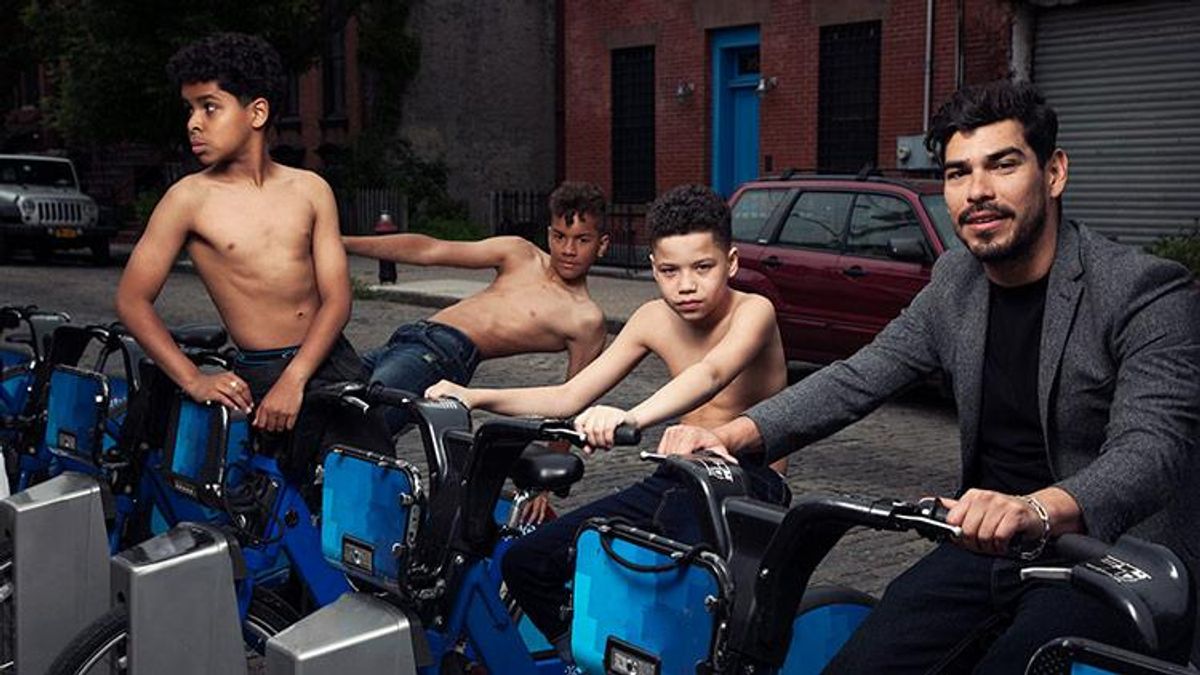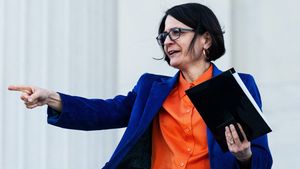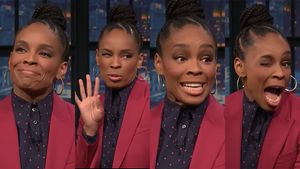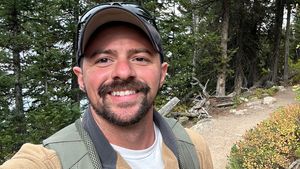"Love is not a clean thing," says actress Sheila Vand, whose mother character, simply called Ma, is the only female presence in We the Animals, the messy, masterful adaptation of Justin Torres's acclaimed 2011 novel. "We're not born with an instruction manual on how to love each other or love ourselves, and we're all a little bit broken," she says. In every sense, We the Animals thrives on this idea -- the permission to be broken and not hide it. The film's director, Jeremiah Zagar, says, "An amazing movie has to be pretty close to being horrible," and that liberating dichotomy fires up each grainy frame of his vision of a Latino-American family in upstate New York. Of her part, Vand is fiercely protective, aware of Ma's love for her children and the delicacy of being "the only woman in the room." There's a poetry to this care. Because if there's one thing We the Animals and its artists let in, one type of brokenness they permit, it's that which unravels every tired trope of masculinity.
Related | Gallery: Every Image From Our We the Animals Cast Shoot
Torres, a gay, half-white, half-Puerto Rican writer, wrote We the Animals largely based on his own experience. He grew up in a loving yet abusive household with two volatile parents and two scrappy brothers. And like his young proxy, who's nameless in the book and called Jonah in the movie, Torres pulled himself through the strange, painful, and ultimately clarifying process of coming out. "The hard facts are the facts of my life," Torres says, citing the familial similarities and the ethnicities of everyone in the story. "But the book is fiction. I didn't want to write a memoir because I didn't want to make any claims on one truth -- my family members have the right to write their own stories." And yet, Torres is open about having lived in a home of violence, often instigated by his father, who -- like Pops, the dad in We the Animals -- expressed his love with his fists. "I think my father was violent with us because that's how he was raised and that's how his father was raised," Torres says. "I think he thought we were going to have a difficult time in the world -- that to be a man in the world, you needed to be tough. One of the ways my brothers and I learned to be tough was getting beaten a lot as kids."
And one of the ways the boys in Torres's tale face the world is with violence. They shove each other and claw at each other and scream at the table and run and bite. They're like animals -- gnashing their teeth in the golden sun. It's feral brotherly play, and also a father's abuse manifest as mimicries of manhood. But the youngest boy (Jonah, if you will; Torres, if you'd like) begins to withdraw from this hand-me-down fierceness. Privately, he puts his feelings in a journal, and slowly, he sees those feelings as less and less damning. Of his own experience, Torres says, "Maybe it did toughen me up, but toughness is overvalued. One of the things we all have to learn to do is become more vulnerable, and fear of that is what plagues the father and brothers in this story, and in this film. It's not that people aren't tough enough, it's that they're terrified of vulnerability. And you don't want to become so tough that you can't appreciate the grace and beauty and softness and femininity of the world."
Torres's worldview, and its distillation into a 125-page book, is what hooked Zagar. The filmmaker had recently returned from Egypt, after doing editing work on 2013's politically charged doc The Square, and he was inspired by that film's revolutionaries. He wanted a story to tell. He found We the Animals in a New York bookstore and read it in one sitting. "Then I went and bought 30 copies of it," Zagar says. "I had stacks of 'em. I gave it to everybody because I loved it so much. I gave it to my producer. I was like, I'm going to make this into a movie." Zagar's first feature was the 2008 documentary In a Dream, which profiled his father, a mentally ill mosaic mural artist from Philadelphia. It was another story that deconstructed traditional views of maleness.

Isaiah Kristian in Tommy Hilfiger sweater and Raul Castillo in Levi's jacket
"When I was very young, I saw my father as this giant hero," Zagar says, "and then he slowly became much more sick and it was easier to celebrate him as a human. I grew to love him much more as a very fragile, vulnerable human being. And I began to love the idea of breaking down our heroes into human beings."
Zagar compares his father to the character of Ma, who "rides that world of depression and sanity in a similar way." And he says he personally related to the book's savage, unsanitized brand of domestic love, where "a punch and a hug were not so far apart." He and Torres first met over oysters at a bar, and the author remembers having some apprehensions, as a previous filmmaker once wanted to turn his novel into a sitcom. "I always thought, If this is gonna be done, I want it to be a unique, artistic interpretation of what I wrote," Torres says. "Jeremiah had ideas about how he'd shoot certain surreal moments that were really exciting to me. There's this element of imagination and magic in the book that he really wanted to be in the film." And Zagar had no goals of drastically mutating We the Animals. "I feel like people are told that once they option a book, and begin to write the screenplay, they should have as little communication with the author as possible. I've had screenwriters and filmmakers tell me how they'd try to make the story their own -- to the point that the book was a liability. It was the opposite for me. I wanted Justin involved as much as possible. No matter how much I related to the book, I was never going to know the material like the author."
This meant Torres was invited to chime in on the writing process, to consult on set, and to weigh in on the casting, including that of the three boys, Jonah, Joel, and Manny (who, after an 18-month search through more than 1,000 kids, would be played by newbies Evan Rosado, Josiah Gabriel, and Isaiah Kristian). It also meant Torres could help to ensure that the movie retained the book's queer essence. "When I met Justin," Zagar says, "he was clear that he wanted the story to have a strong queer backbone -- that it was a coming-out story, authentically about a young, homosexual boy discovering his sexuality." In response, Zagar enlisted his friend, gay co-writer Daniel Kitrosser, who also kept a journal while finding himself in his youth, and offered a perspective that Zagar couldn't as a straight man. Additionally, Zagar was challenged to sensitively depict a child's connection to sex (the queer boy in the book is 16 by the end; Jonah is barely a preteen throughout the film), and to make the child's pivotal journal translate to the screen. "It was Jeremiah and Dan's idea to make Jonah an artist," says Torres, who praises the movie's vivid, tactile animations, which spring from Jonah's intimate doodles. "They made him someone who draws as well as writes because now we're in this visual realm. So much of the book is about what's happening internally with this boy. The animation allows you to understand the violence and trouble and urgency of his inner life."

Isaiah Kristian, Evan Rosado, and Josiah Gabriel all in Levi's
Still, a key puzzle piece in all of this was casting the role of Pops, a highly complex character who's brutal but not monstrous, and who serves as the main male influence in Jonah's life. Raul Castillo, best known for his work as Richie on HBO's Looking, auditioned for Zagar and Torres in the summer of 2015. "He understood so much," says Torres, who adds that he and Castillo connected deeply in regard to Latino machismo, which may allow different types of male touch than the common codes in the U.S.A., but frowns viciously on, say, a man doing a "woman's" work. "He asked me a lot of questions about the book and my own experience. And soon he was like, 'I know this father. I know how charming he is. I know the sources of his charms, and the explosiveness that lies just underneath.' "
Related | 17 of the Best LGBTQ Films of 2018 (Recent & Upcoming)
Castillo, who landed the part, says, "Justin really captured what it is to be a boy in his book, and how the world projects masculinity at you, and how you have to figure out how to fit into that." Castillo is straight, but that didn't make his adolescence as a sensitive "crybaby" in blue-collar Texas much easier. His strong interest in theater and the arts may have made him popular with the girls, but it also led to his being punched in the face by other boys. ("Fuck yeah," he says when drawing up the memory -- as in, "You'd better believe it"). Castillo says he acted out by being a bully himself, picking on a "presentably queer" kid when he was an eighth-grader in Catholic school. He remembers the boy's name: Hector. And he regrets what he did. "We gave that kid so much shit, and I didn't learn that at home," Castillo says. "My mother and father never used homophobic language, but I was horrible to this kid. I realized later that society taught me to do that. He was different, and I was dying to be like everyone else. What I love about We the Animals is that it explores true masculinity, not these cartoon versions of it, which are creating monsters out of young boys because we're not given the proper tools."
Castillo likens We the Animals to James Joyce's coming-of-age novel, A Portrait of the Artist as a Young Man. "It's about the awakening of a male's consciousness, and sexuality is a major part of that," he says. Onscreen, Jonah's awakening is portrayed in a gradual flow of magical realism and subtle, aching self-realization. In one scene, Jonah is lying six feet deep in an unclaimed grave, letting the rain hit his face and the mud fill up around his shoulders. He remains stiff and still until he levitates into the air and goes soaring above the trees, the camera in breathless pursuit. It's a sink-or-swim moment, a be-me-or-die choice, and it deepens the film's constant metaphorical tension between drowning and flight. "The book is like a dream memory of my life turned into art," says Torres, "and the film is like this dream of a dream." The synchronicity and commonality of these artists show that the dream is also transcendent, rising above backgrounds, orientations, and society -- above nature and nurture alike.
"We are nuanced, unclear people," Zagar says. "And then we understand each other through specificity. The way I grew up is specific, and so different from the way Raul grew up and the way Justin grew up, and yet, we're exactly the same. We're all these confused, frightened children with tremendous potential to collapse and tremendous potential to succeed. And tremendous potential to understand each other."
We the Animals opens in theaters August 17.
Photography by M. Sharkey
Styling by Alexandra Weiss and Amber Nicole



























































































